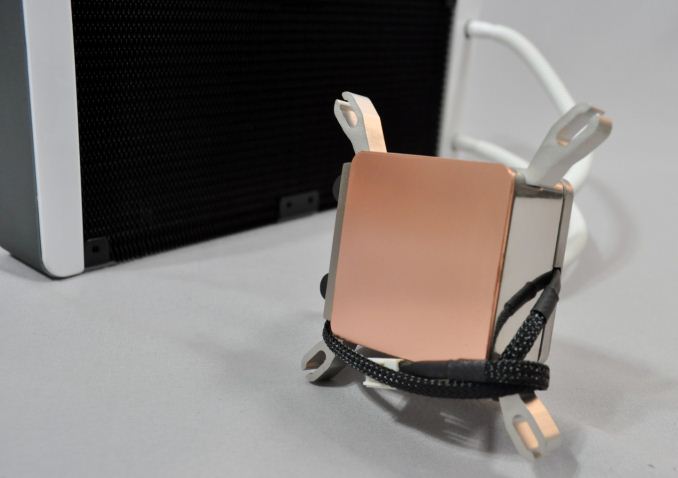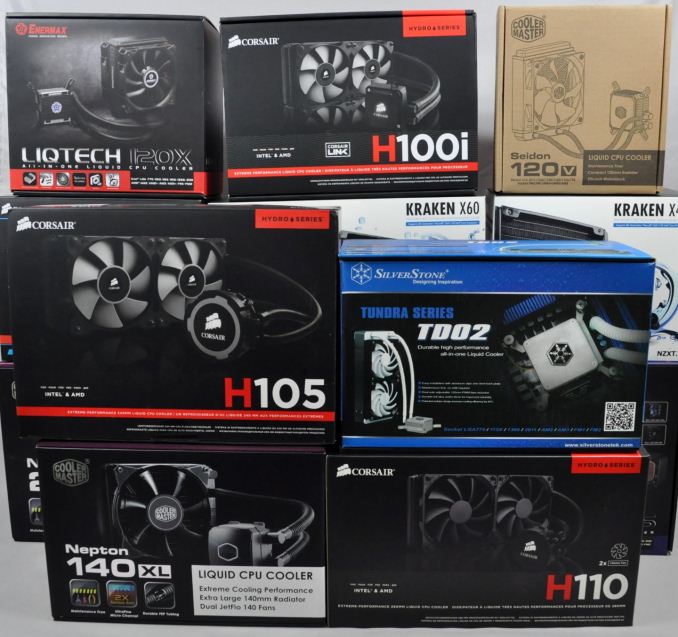Closed Loop AIO Liquid Coolers: 14-way Mega Roundup Review
by E. Fylladitakis on February 12, 2014 7:00 AM EST
Remember the time when liquid cooling a computer chip was considered to be an extreme approach, one performed by hardcore enthusiasts and overclockers alone? Everything had to be personally designed and or procured by the user, as there were no specialized commercial products available at the time. Radiators were modified heater cores extracted from cars, CPU blocks were rare and occasionally machined at local workshops using a copper block and a lathe, while high-performance tubing came from shops with medical supplies.
As demand grew, aided by the ever-increasing noise of small CPU heatsinks, companies specializing on liquid cooling solutions began turning up -- a little too fast perhaps, as tens of companies were founded within a few months' time and very few of them actually survived for more than a couple of years. Enthusiasts could then buy specialized liquid cooling equipment and even whole kits from just one seller and only had to assemble the setup into their system. That of course is no simple process for an amateur and a nightmare for a system builder, who cannot ship a system with a topped off water cooling tank or assume that the user has the skills required to maintain such a system, therefore the potential market remained limited to advanced users only.
This all changed in 2012, when Asetek came up with an inexpensive closed loop solution, a liquid cooling device that was leak-free and required no maintenance at all. The radiators of the first few solutions were small and their overall performance hardly better than that of air coolers; however, aided by the modernization of computer cases, the mounting of larger, thicker radiators inside a PC soon was not a problem. In many cases the kits were now no harder to install than any CPU cooler and required no maintenance at all, opening the market to virtually every computer user seeking a performance cooling solution. This spurred massive interest amongst OEMs and manufacturers, who all strive for a slice of the pie.
There have been tens of AIO (All-in-One) closed loop liquid coolers released just in 2013; today, we are having a roundup with 14 of them, coming from five different manufacturers, alphabetically listed in the table below.
| Product | Radiator Effective Surface | Radiator Thickness | # of Fans (Supplied / Maximum) | Speed Range of Supplied Fans (RPM) | Current Retail Pricing |
| Cooler Master Seidon 120V | 120mm × 120mm | 27mm | 1 / 2 | 600-2400 | $49.99 |
| Cooler Master Nepton 140XL | 140mm × 140mm | 38mm | 2 / 2 | 800-2000 | $99.99 |
| Cooler Master Nepton 280L | 140mm × 280mm | 30mm | 2 / 4 | 800-2000 | $119.99 |
| Corsair H75 | 120mm × 120mm | 25mm | 2 / 2 | 800-2000 | $69.99 |
| Corsair H90 | 140mm × 140mm | 27mm | 1 / 2 | 600-1500 | $84.99 |
| Corsair H100i | 120mm × 240mm | 27mm | 2 / 4 | 800-2700 | $109.99 |
| Corsair H105 | 120mm × 240mm | 38mm | 2 / 4 | 800- 2700 | $119.99 |
| Corsair H110 | 140mm × 280mm | 29mm | 2 / 4 | 600-1500 | $126.99 |
| Enermax Liqmax 120S | 120mm × 120mm | 32mm | 1 / 2 |
600-1300 600-2000 600-2500 (Multi-range) |
$163.00* |
| Enermax Liqtech 120X | 120mm × 120mm | 43mm | 2 / 2 |
600-1300 600-2000 600-2500 (Multi-range) |
$171.10* |
| NZXT Kraken X40 | 140mm × 140mm | 27mm | 1 / 2 | 800-2000 | $89.99 |
| NZXT Kraken X60 | 140mm × 280mm | 27mm | 2 / 4 | 800-2000 | $119.99 |
| Silverstone Tundra TD02 | 120mm × 240mm | 45mm | 2 / 4 | 1500-2500 | $118.99 |
| Silverstone Tundra TD03 | 120mm × 120mm | 45mm | 2 / 2 | 1500-2500 | $97.99 |
*The coolers from Enermax are not widely available in the USA at the time of this review, with the only viable option appearing to be that of import from Asia or Europe.
Although Asetek was the first to come up with the design and they hold patents for it, they are not the only OEM of AIO cooling solutions today. At least three different OEMs are behind the kits listed in the table above. We will have a closer look at each one of them in the following pages.











139 Comments
View All Comments
E.Fyll - Wednesday, February 12, 2014 - link
I do not like listing "winners", giving ratings and stuff like that. From a pure performance point of view, perhaps you are right. The H110 will not fit in a case however that can only take 280 mm long radiators. It may be too expensive for some. Too ugly for others. Too black. Even too mainstream (yes, there are people who think like that).I hate ratings because they are subjective and misleading. It reminds me exactly of that:
http://i.imgur.com/B5TgS.jpg
If I give a good rating on three products for entirely different reasons, that does not mean that they are anywhere near the same or meant for the same groups of users. Yet, most people would only check the rating and think that they are similar. Furthermore, just because I gave a product a good rating, that does not make it good for everyone; it could be entirely useless to certain people and target groups. As I said before, I am not fond of basing any part of a review on subjective elements and I despise the very idea of imposing my thoughts to others.
How about I stick to testing and writing and you (the readers) give the ratings you think each product deserves? :)
The PC Apologist - Wednesday, February 12, 2014 - link
From the AnandTech About page, under Review Philosophies:"Our reviews incorporate a mixture of objective and subjective based analysis, the balance varying where appropriate. We are not a site that exclusively relies on data based comparisons but also deliver honest user experience evaluations as well. Some reviews lend themselves to data driven analysis more than others (e.g. CPU review vs. smartphone review), but we always attempt to provide both in our coverage. I fundamentally believe that you need both to accurately portray any product. Numbers are great for comparative analysis, but without context they can be meaningless. Similarly, personal opinions are great to help explain what owning a product may be like, but without data to back up some claims the review lacks authority (e.g. average vs. good battery life begs to be quantified)."
E.Fyll - Thursday, February 13, 2014 - link
True. However, that text also describes the philosophy behind articles that belong in dozens of different categories.My objective analysis relies on testing and data. My professional opinion lies on the description of the product, its quality, flaws and uses. I can and do comment on the design and appearance. However, whether it is beautiful/useful for you or not, I believe that you can decide that for yourself, you do not need me to tell you that. :)
That being said, subjective opinions are extremely useful in other articles, but in a cooler review they are nothing sort of useless to the end reader. My personal preferences and tastes are of no use to anyone but myself. So, you can possibly say that my subjective opinion about my articles is that you can make up your own mind. ;)
Sushisamurai - Thursday, February 13, 2014 - link
Agreed. I'd buy a NZXT case vs a better case (thermal and sound performance) at a higher price, for many "irrational" reasons: my wife thinks black matches the decor of the room, and aesthetically, it may look nicer. Is it the best in terms cost and time efficiency? Hardly, but the utility I get from a happy wife is more than enough to make up for it.Sushisamurai - Thursday, February 13, 2014 - link
And... Even though some AIO coolers may perform better, sometimes the wife just wants matching logos and parts. ...so thank you Anandtech and your wonderful reviewsThe PC Apologist - Thursday, February 13, 2014 - link
I think you may be onto something there, something big.The objective vs. subjective struggle is extremely related to what I plan to offer AnandTech.
But such a challenge is no easy task, which is why I will only submit my work after much thought and deliberation.
zlandar - Wednesday, February 12, 2014 - link
Really well done and thorough roundup.killer14 - Thursday, February 13, 2014 - link
no swiftech sets.. to bad...killer14 - Thursday, February 13, 2014 - link
to bad no swiftech sets where tested, like the H220coachingjoy - Thursday, February 13, 2014 - link
Great topic, good job.Validates my usage of Corsair products.
In the minds eye H90 would work better than thinner solutions.
It does! Good for Corsair.
Thanks